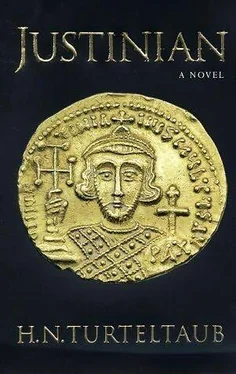Harry Turtledove - Justinian
Здесь есть возможность читать онлайн «Harry Turtledove - Justinian» весь текст электронной книги совершенно бесплатно (целиком полную версию без сокращений). В некоторых случаях можно слушать аудио, скачать через торрент в формате fb2 и присутствует краткое содержание. Жанр: Историческая проза, на английском языке. Описание произведения, (предисловие) а так же отзывы посетителей доступны на портале библиотеки ЛибКат.
- Название:Justinian
- Автор:
- Жанр:
- Год:неизвестен
- ISBN:нет данных
- Рейтинг книги:3 / 5. Голосов: 1
-
Избранное:Добавить в избранное
- Отзывы:
-
Ваша оценка:
- 60
- 1
- 2
- 3
- 4
- 5
Justinian: краткое содержание, описание и аннотация
Предлагаем к чтению аннотацию, описание, краткое содержание или предисловие (зависит от того, что написал сам автор книги «Justinian»). Если вы не нашли необходимую информацию о книге — напишите в комментариях, мы постараемся отыскать её.
Justinian — читать онлайн бесплатно полную книгу (весь текст) целиком
Ниже представлен текст книги, разбитый по страницам. Система сохранения места последней прочитанной страницы, позволяет с удобством читать онлайн бесплатно книгу «Justinian», без необходимости каждый раз заново искать на чём Вы остановились. Поставьте закладку, и сможете в любой момент перейти на страницу, на которой закончили чтение.
Интервал:
Закладка:
I do not know whether or not he burnt them. I do know I never saw them again. That was what I wanted.
When spring returned to the world, the ecumenical patriarch Paul finally had the grace to depart from it. The synod of bishops of the see of Constantinople having sent me the traditional three names from which I could make my choice of Paul's successor, I selected a certain Kallinikos, he having a better reputation for pliability than either of the other two.
On meeting him, I found Kallinikos's demeanor and physiognomy to accord with his reputation. He was a round little man, with no sharp angles on his face or anywhere else about his person. By the way he leaned forward as if hanging on my every word, he gave the impression of being eager to please me.
Nor, in fact, was that impression false. Kallinikos was eager to please me. Kallinikos was eager to please everyone. He had a great many chances, and used every one of them. He was so eager to please, he would have made a better whore than a patriarch, but I did not know that at the time.
"I want you to draft a letter to Sergios, the patriarch of Rome," I told him, "bidding him to come to his senses, to accept the presence of the Holy Spirit at the fifth-sixth synod, and to acknowledge the canons the bishops established at that synod. His own legates, after all, were present there, as were other bishops from the patriarchate over which he has jurisdiction. Remind him of all this in no uncertain terms."
"It shall be just as you say, Emperor," Kallinikos promised, and it was just as I said. A couple of days later, he sent me a draft of his letter for my approval. The text was, if anything, even more fiery than I had hoped. I told him to send it to stubborn Sergios forthwith. For the moment, I was the man he was trying to please, and he was doing a splendid job.
Sergios's reply reached this God-guarded and imperial city as quickly as such things can be expected, given the distance between Rome and Constantinople and the difficulties and delays likely to be encountered on the journey. On account of its contents, though, I would have been as glad had it taken longer on the way, it being full of the same pretentious obstinacy the bishop of Rome had already displayed.
"Emperor, I stand ready to threaten this manikin of a Sergios with even harsher strictures than those of my last letter," Kallinikos declared, "strictures up to and including anathema."
"I thank you for that," I said, and meant it: patriarchs of Constantinople have been known to care more for accommodating themselves to the bishop of Rome than to the Emperor of the Romans. "Sergios did not seem to understand when two of his henchmen were fetched to Constantinople. The time for letters has passed, Kallinikos. I aim to fetch the pope here, to let him answer for his own transgressions."
"How right you are!" Kallinikos exclaimed, also sounding as if he meant it. No doubt he did. He was, however, ready to say How right you are! to anyone who told him anything of any sort.
Off went the letter. In it I told Zachariah to do with Pope Sergios as my grandfather had told the exarch's predecessor at that time to do with Pope Martin: to arrest him and bring him to the imperial city so I could pass judgment on him. My grandfather had sent Pope Martin to Kherson. To me, that seemed a good enough destination for Sergios.
Just how good it was, I would find out in due course.
MYAKES
By the time Justinian became Emperor, Brother Elpidios, his family had been ruling the Roman Empire for more than eighty years. Like he says, people loved the house of Herakleios. People had reason to love it. Without the house of Herakleios, there probably wouldn't be a Roman Empire any more.
Justinian, now, by the time he's writing of here, he'd been Emperor about nine years. In those nine years, he'd taken all the goodwill people had for his family and chucked it right into the latrine. It might not have happened that way if some of the things he'd tried had worked out better- if we'd beaten the Arabs at Sebastopolis, for instance. Who but God can say for sure about something like that?
But what really wrecked things for him was that he went on doing whatever he thought he needed to do right then, and never had a clue that people were starting to spit when somebody said his name. Paul the patriarch and Sisinniakes both tried to tell him- you read me what they said. And you heard for yourself- he wouldn't listen.
Remember something else, too, Brother. Justinian was writing here years after what he's talking about. He still doesn't see or doesn't believe what people were telling him back then. He knew what happened to him. As long as he lived, he never figured out why.
JUSTINIAN
Not long after the letter to Zachariah started on the long journey to Ravenna, I was startled to receive a request for an audience from the monk Paul, who had been identified to me as a warm friend of Leontios's. Not only was I surprised, I was intrigued. This Paul must have known I knew of his attachment to a man who, to put it mildly, I did not find pleasing. Under those circumstances, asking for an audience with me took a certain amount of what was either courage or hubris. Trying to learn which, I granted the request.
Paul put me in mind of my Theodotos: he was intensely certain of his purpose. Also like Theodotos, he wasted no time in small talk. Having risen from his prostration, he said, "Emperor, I have come to ask you to free the brave general Leontios."
"Why should I?" I demanded, my tone halfway between anger that he should dare to say such a thing and curiosity as to why he said it.
"First and foremost, from simply Christian charity," he answered. "No man deserves to be caged like a wild beast, and Leontios less than most."
I shook my head. "As a man, I might do this," I said. That left open the possibility I also might not do it, which was far more likely. I continued: "As Emperor of the Romans, I cannot. By his bungling, Leontios cost the Roman Empire far too much to let me casually forgive him."
"But, Emperor, in his earlier campaigns he gained great glory and advantage for the Roman Empire," Paul said. "Should you not weigh the one in the pans of the balance against the other?"
"When he won victories, he was promoted. He was rewarded. How else did he become a rich man, and a general to whom I entrusted a great army?" I said. Paul remained silent- what could he reply to that? Leaning forward on the throne, I asked him, "Are you telling me a man who is rewarded for his successes should not be punished for his failures?"
"No, Emperor," he said; had he said anything else, I would have had him thrown out of the throne room. He had spirit, though, continuing, "But does he deserve to be punished so harshly for a misfortune that partly sprang not from any error of his own but from the treachery of the barbarous Sklavenoi?"
As he had been nowhere near the field by Sebastopolis, he must have spent a lot of time listening to Leontios in his cell. I answered, "I have punished the Sklavenoi, or such of them as I have laid hands on, as they deserved. Shall I treat Leontios as I treated them?"
"No, for he was no traitor, only a man brought down by the treachery of others," Paul said, arguing like a lawyer.
"That is not so; he disobeyed my orders, which, had he followed them, might have brought us victory in spite of the Sklavenoi," I told the monk. He looked down at the floor, again not knowing how to respond. I daresay Leontios, doing his utmost to show himself in the best possible light, had never bothered to mention that small detail. Scowling down from the throne at Paul, I said, "Can you still honestly tell me this wretch deserves his freedom?"
To my surprise, he nodded. "As I said before, Emperor, a tiny, stinking cell is no fit home for a man. If you cannot find it in your heart to forgive him, would you be generous enough to commute his sentence from imprisonment to exile?"
Читать дальшеИнтервал:
Закладка:
Похожие книги на «Justinian»
Представляем Вашему вниманию похожие книги на «Justinian» списком для выбора. Мы отобрали схожую по названию и смыслу литературу в надежде предоставить читателям больше вариантов отыскать новые, интересные, ещё непрочитанные произведения.
Обсуждение, отзывы о книге «Justinian» и просто собственные мнения читателей. Оставьте ваши комментарии, напишите, что Вы думаете о произведении, его смысле или главных героях. Укажите что конкретно понравилось, а что нет, и почему Вы так считаете.












